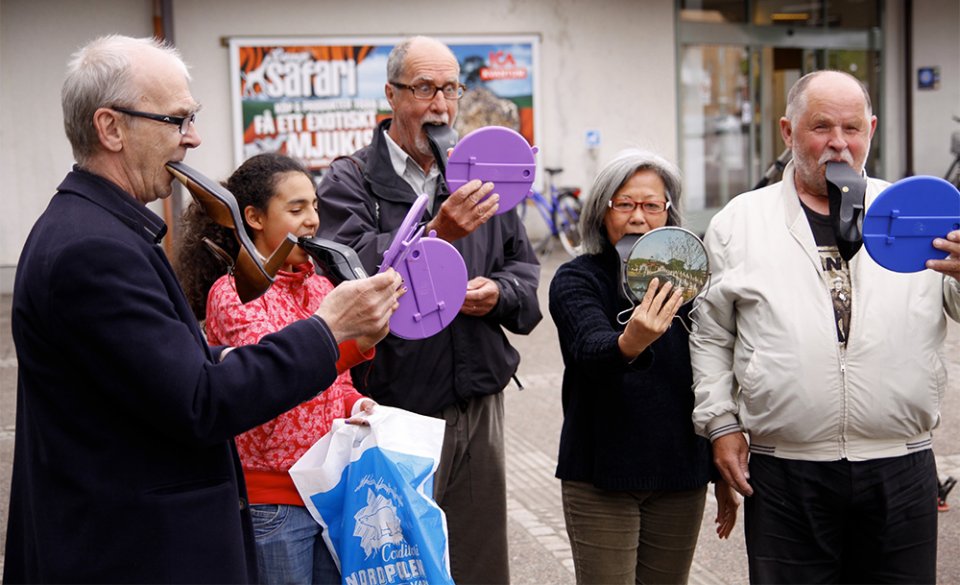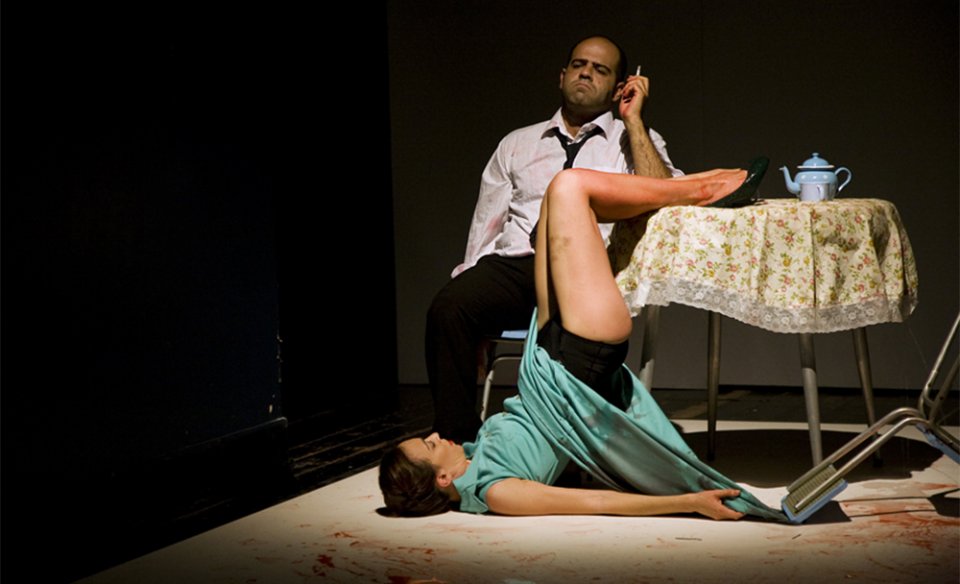We all know how the M1 Singapore Fringe Festival always tries to go above and beyond to create conversations about touchy issues. And in wanting to do so, they’ve ruffled some feathers before; but it’s a little different this year. We’ll talk about that later.
 “Let’s Walk” by Amanda Heng
“Let’s Walk” by Amanda HengNow in its 14th edition, the festival, happening on Jan 17-28 next year, moves away from its usual thematic concept of “Art & ____”, and focuses on a new direction that calls on artists to conceptualize or feature works that are themed around iconic Singaporean artists and their works. The theme this year, “Let’s Walk”, is derived from a series of street performances of the same name by contemporary artist Amanda Heng.
This performance piece debuted in response to the 1997 Asian financial crisis when female employees were the first to be let go from companies. During that same period, sales in the beauty industry went through the roof because women turned to beauty and cosmetic treatments to make themselves look better out of desperation to keep their jobs. Disturbed, Heng egged the public on to join her in walking backwards with high-heeled shoes in their mouths while using handheld mirrors to guide their way on the streets.
 “The Neighbor’s Grief is Greener” by Emanuella Amichai
“The Neighbor’s Grief is Greener” by Emanuella AmichaiThe festival will be showcasing works that build on, highlight and respond to the many questions and themes that Heng’s piece focused on, such as gender, beauty and identity. Some of the works we’re looking forward to include The Immortal Sole by award-winning choreographer Edith Podesta, a dance number exploring beauty, inequality and perceptions of traditional women’s roles through a reinterpretation of The Little Mermaid; and the heavy The Neighbor’s Grief is Greener by Israeli choreographer Emanuella Amichai, a bloody performance piece that tests and critiques the stereotypes surrounding the “ideal women” portrayed in mass media in the ‘50s. You can find the full line-up of the festival here.
Now comes the drama. Just hours before the press conference that took place on Oct 10, artist collective The Glory Hoes, which holds monthly interactive queer film experiences at The Projector, released a statement that accused the organizers—The Necessary Stage (TNS), a non-profit theater company formed by Alvin Tan in 1987—of censorship (you can read the release in full here).
This happened after their event, The Glory Hoes present Paris is Burning (1990), was withdrawn just as the official program brochure was going to print and after confirmation of the collective’s participation in the festival. TNS’ reason? Inclusion of the event could potentially be “spun to look like the Fringe is celebrating the LGBT lifestyle”, noting that M1 has expressed that the funding of the festival is “predicated on 2018 being a year free of controversy”. The collective considers this “queer erasing, homophobic and queer bashing”.
This is problematic for a number of reasons: it brings into question how funding of the arts continues to compromise artistic freedom in Singapore and shows how easily the visibility of queerness is removed in the interests of stakeholders. The collective has also questioned this “strategic maneuver”, seeing how the event was slated for Fringe Conjunction, a segment that doesn’t fund the programs under it.
TNS was swift in releasing their statement at the press conference (now online here), stating that they’re “taking special care not to have a recurrence of a furore where works presented are taken out of context by smaller, possibly less discerning groups of people”, in reference to this year’s debacle, adding that this edition will explore other issues like “migration, the refugee crisis, identity, a woman’s perceived role and place in society, and the pressures women face in the world around them”.
We spoke to Melissa Lim, TNS’ general manager, who commented that they’ve “covered many works that also deal with LGBT issues, be it in an overt way or in a more subtle manner” in response to the collective’s statement about the LGBT community being silenced. She also said that the festival can’t possibly “represent every issue all the time” and that just because they’ve decided on a set of themes to explore this edition, it “doesn’t mean that [they] wouldn’t go back to issues that are not covered” this time round. How then, can the inclusion of one event, “be spun to look like the Fringe is celebrating the LGBT lifestyle”?
Lim also wanted to make it clear that the program isn’t finalized until they announce it to the press on the media launch day, which contradicts what The Glory Hoes have said in their statement; clearly a misunderstanding that wasn’t communicated properly to the collective. Keep in mind that throughout the ordeal, TNS did agree that a conversation about funding was necessary but declined to lead the conversation, according to the timeline provided in the statement by The Glory Hoes.
While it has been discussed that state funding does indeed help to drive our arts scene forward (in this case, it’s corporate funding), there’s still a lot to be said about how it affects creative freedom and in turn, the censorship that it comes with. Whenever someone puts out a piece of work that’s funded, we can’t help but wonder how much of the creator’s creative soul has been repressed because he or she doesn’t want to compromise the funding received. Remember when the National Arts Council (NAC) took its grant back from author Jeremy Tiang? That’s just one of many instances, and we can’t help but wonder when this is going to stop. How about that time when Sonny Liew returned NAC’s grant to have “more freedom in terms of timeline and content” for a new book?
The Glory Hoes also question if TNS really believes that silence in the face of censorship can help forward the greater cause of artistic freedom in Singapore. Founding director of the Singapore International Festival of Arts (SIFA), Ong Keng Sen, also mentioned in our interview with him earlier this year how funding comes with a lot of strings. In his words: “What is happening right now is that a lot of government funding is coming with a lot of ties; ties like you can’t talk about this or you can’t talk about that. So it becomes a situation where they are basically saying, ‘Hey we are paying for this, you cannot write about us.'”
He added, “In order for the arts to remain in a place where we can still speak in relevant ways, we have to fund it ourselves. And it doesn’t cost very much.” But whether arts should give up funding if it causes censorship is a discussion for another day. While we do value the fact that the M1 Singapore Fringe Festival gives the literal “fringes” of art and society a platform to express themselves, and to be seen and heard, what’s a fringe festival if it doesn’t exactly embrace the entire spectrum of this “fringe”? It feels like TNS has stepped back rather than push the envelope; it really feels like a major cop out.
At a time when a minority group is being silenced in a way so blatant, it’s a real shame that an organization like TNS, which is at the forefront of the arts scene in Singapore, has decided to bite their tongue. As Becca D’Bus, one of the three members of The Glory Hoes, puts it, “As members of the gay community, our history has taught us many painful lessons. Real lives have ended because those with power have insisted on silence and wishing away embarrassing problems. We owe it to our elders to speak now.”
That said, we’re going to see how this pans out in the next couple of weeks. As for the withdrawn program, it’ll still go on as planned, with or without the festival. Details to be announced soon.





